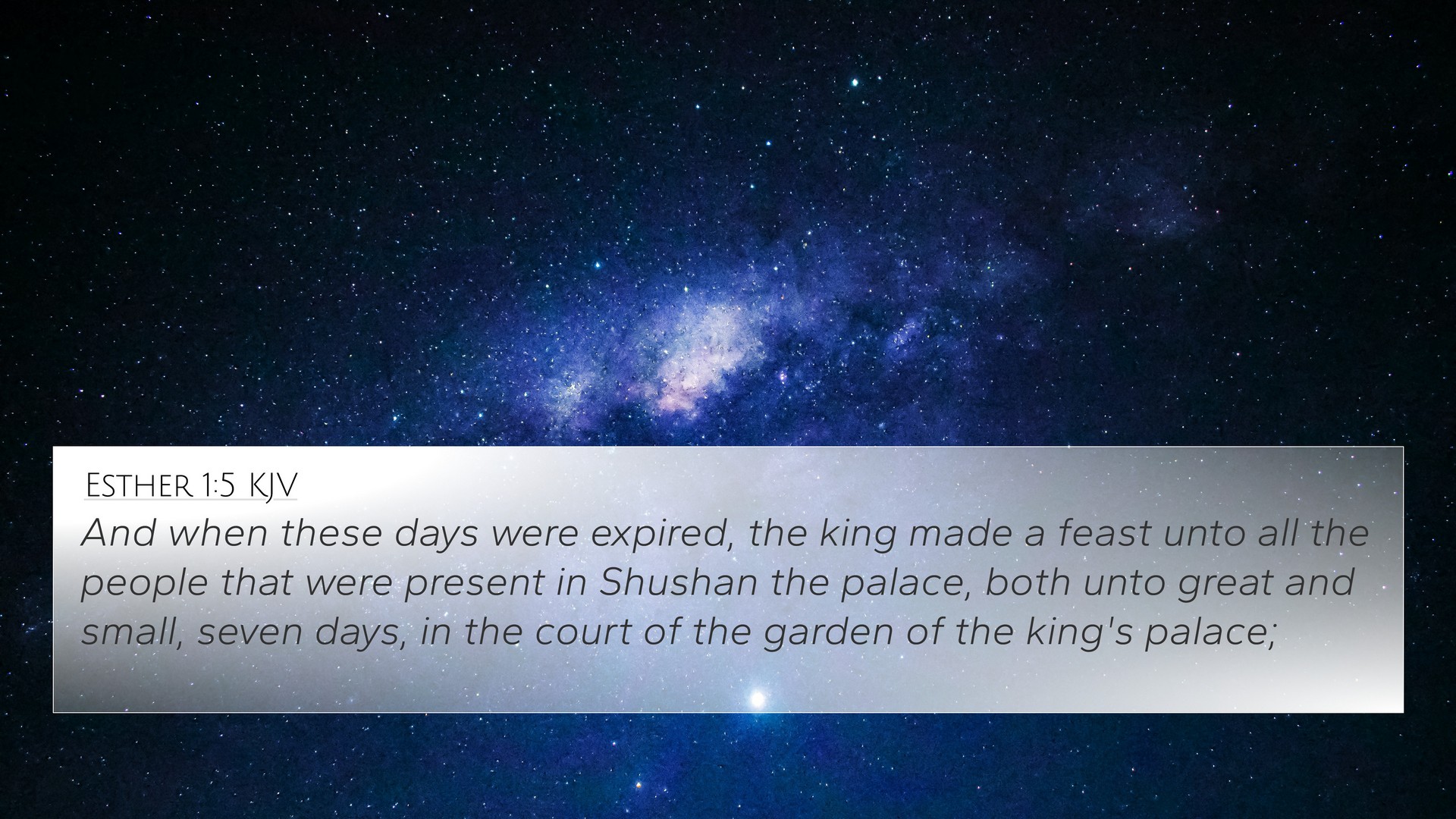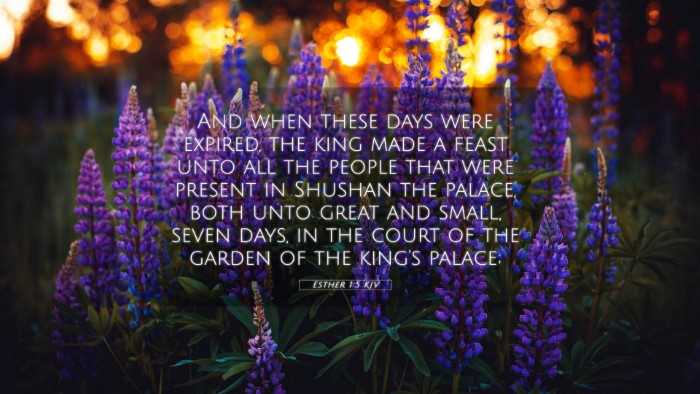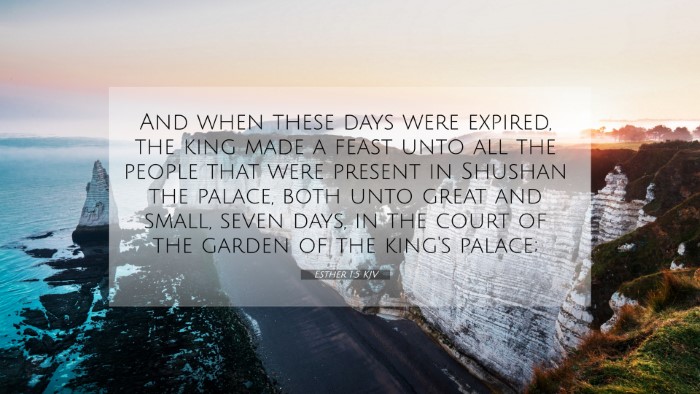Old Testament
Genesis Exodus Leviticus Numbers Deuteronomy Joshua Judges Ruth 1 Samuel 2 Samuel 1 Kings 2 Kings 1 Chronicles 2 Chronicles Ezra Nehemiah Esther Job Psalms Proverbs Ecclesiastes Song of Solomon Isaiah Jeremiah Lamentations Ezekiel Daniel Hosea Joel Amos Obadiah Jonah Micah Nahum Habakkuk Zephaniah Haggai Zechariah MalachiEsther 1:5 Similar Verses
Esther 1:5 Cross References
And when these days were expired, the king made a feast unto all the people that were present in Shushan the palace, both unto great and small, seven days, in the court of the garden of the king's palace;
Uncover the Rich Themes and Topics of This Bible Verse
Listed below are the Bible themes associated with Esther 1:5. We invite you to explore each theme to gain deeper insights into the Scriptures.
Esther 1:5 Cross Reference Verses
This section features a detailed cross-reference designed to enrich your understanding of the Scriptures. Below, you will find carefully selected verses that echo the themes and teachings related to Esther 1:5 KJV. Click on any image to explore detailed analyses of related Bible verses and uncover deeper theological insights.
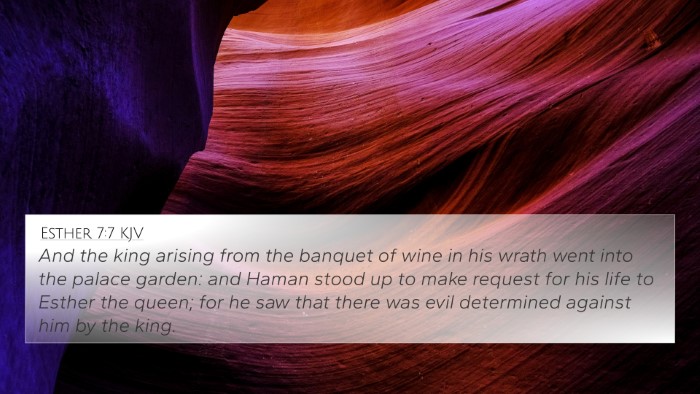
Esther 7:7 (KJV) »
And the king arising from the banquet of wine in his wrath went into the palace garden: and Haman stood up to make request for his life to Esther the queen; for he saw that there was evil determined against him by the king.
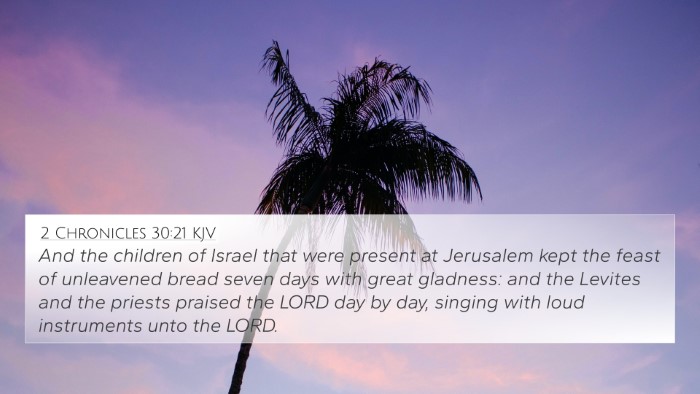
2 Chronicles 30:21 (KJV) »
And the children of Israel that were present at Jerusalem kept the feast of unleavened bread seven days with great gladness: and the Levites and the priests praised the LORD day by day, singing with loud instruments unto the LORD.
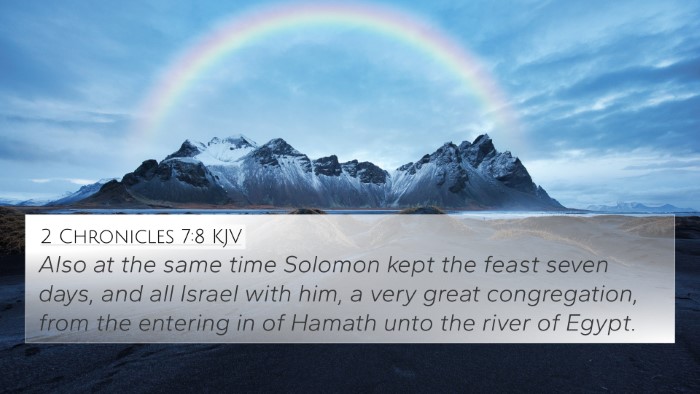
2 Chronicles 7:8 (KJV) »
Also at the same time Solomon kept the feast seven days, and all Israel with him, a very great congregation, from the entering in of Hamath unto the river of Egypt.
Esther 1:5 Verse Analysis and Similar Verses
Understanding Esther 1:5
Esther 1:5 states: "And when these days were expired, the king made a feast unto all the people that were present in Shushan the palace, both unto great and small; seven days, in the court of the garden of the king's palace." This verse serves as a crucial setting for the Book of Esther, showcasing the opulence and the royal customs of the Persian Empire.
Contextual Overview
The context of this verse is vital as it introduces a significant social and political maneuvering occurring within the narrative. It comes immediately after a period of grand displays of power and wealth by King Ahasuerus, reflecting his authority and splendor.
Commentary Insights
Drawing from public domain commentaries, this verse is analyzed for its implications on the characters and the unfolding events within the book:
-
Matthew Henry's Commentary:
Henry emphasizes how this feast illustrates the king's desire to display his riches and glory, serving both as a means of reinforcing his reign and as a backdrop for the subsequent events involving Esther. It reflects the culture where feasts serve as critical sociopolitical gatherings.
-
Albert Barnes' Notes:
Barnes highlights the grandeur of the feast, which lasts for seven days, noting that it demonstrates not just the wealth of the king but also the luxurious lifestyles of the people in his court. This temporary indulgence sets the stage for later contrasts when Esther appears before the king.
-
Adam Clarke's Commentary:
Clarke points out the symbolic significance of the garden setting, representing the paradise lost and the potential for restoration that Esther represents. The choice of location plays a role in the thematic development of the story.
Thematic Connections
Thematically, Esther 1:5 can be connected to several scriptures that reflect the grandeur of kings, feasting, and divine intervention:
- Proverbs 21:1: "The king's heart is in the hand of the LORD, as the rivers of water: he turneth it whithersoever he will." This verse underscores the divine control over royal activities.
- Ecclesiastes 2:24: "There is nothing better for a man than that he should eat and drink, and that he should make his soul enjoy good in his labour." This relates to the enjoyment of feasting.
- 1 Kings 10:21: "And all king Solomon's drinking vessels were of gold, and all the vessels of the house of the forest of Lebanon were of pure gold; none were of silver; it was nothing accounted of in the days of Solomon." Reflects on the wealth of kings.
- Acts 13:22: "And when he had removed him, he raised up unto them David to be their king; to whom also he gave testimony, and said, I have found David the son of Jesse, a man after mine own heart, which shall fulfill all my will." This verse connects the theme of kingship to divine purpose.
- Luke 14:10: "But when thou art bidden, go and sit down in the lowest room; that when he that bade thee cometh, he may say unto thee, Friend, go up higher." Relates to humility in social settings.
- John 2:1-10: The Wedding at Cana, where Jesus transforms water into wine, serves as another instance of a feast demonstrating glory and divine intervention.
- Genesis 41:30-31: Joseph’s interpretation of Pharaoh's dreams which led to preparations for a feast during famine, showcasing the importance of feasting in times of abundance and preparation for hardship.
Biblical Cross-References and Connections
The study of Esther 1:5 benefits significantly from cross-referencing with other Biblical texts. Not only does it allow one to see the interconnectedness of themes, but it also aids in a deeper understanding of the socio-political dynamics at play. Here are multiple ways this verse reflects cross-references within the Scripture:
- Bible verse cross-references: The establishment of feasts can be traced back to previous royal contexts, such as in the books of Kings and Chronicles, emphasizing the tradition of royal gatherings.
- Connections between Bible verses: Links exist between Esther and the practices found in the law of Moses, particularly Leviticus regarding feasting and festivals.
- Linking Bible scriptures: Both Psalms and Songs of Solomon resonate with themes of the garden, representing love and beauty, akin to the setting of Esther’s banquet.
- Comparative Bible verse analysis: Analyzing the feasting culture in Esther alongside the communal feasts described in the New Testament yields rich thematic parallels.
- Bible verses that relate to each other: The heart of the king in Esther resonates with the divine insights evident in letters of Paul addressing rulers and powers (Romans 13).
- Cross-referencing Biblical texts: Tie Esther’s narrative with the rules governing monarchies in the teachings of Jesus concerning humility and service, such as in Matthew 20:27-28.
Conclusion and Reflection
Esther 1:5 is more than a mere introduction; it acts as a foundation upon which the entire narrative of Esther builds. It challenges readers to explore the depth of royal authority, societal norms, and divine providence. By engaging in cross-referencing and thematic exploration, individuals gain a richer understanding of scripture, enhancing both personal study and communal learning.
Further Study Resources
Utilizing tools for cross-referencing, such as a Bible concordance and cross-reference guide, may greatly aid in studying verses like Esther 1:5. Engaging in tools and methodologies for Bible cross-referencing can provide avenues for deeper insights and thematic connections that enrich one’s understanding of scriptural teachings.
